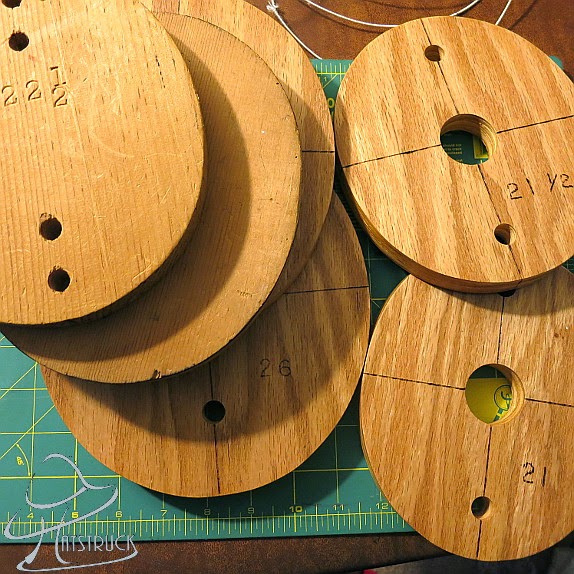
 Regarding the contest, I submitted two hats, the Many Faces of a Mad Hatter, for which I won fourth place; and a second hat, Mad and Hungry, which didn't place, but it was my favorite submission. My winning hat was actually a four-in-one-hat that could be worn four different ways. It could be worn brim only, crown only, brim and crown together, or brim with an origami fan attached. The fan fits under the crown when not in use.
Regarding the contest, I submitted two hats, the Many Faces of a Mad Hatter, for which I won fourth place; and a second hat, Mad and Hungry, which didn't place, but it was my favorite submission. My winning hat was actually a four-in-one-hat that could be worn four different ways. It could be worn brim only, crown only, brim and crown together, or brim with an origami fan attached. The fan fits under the crown when not in use. Finally, I rescued another millinery sewing machine. It's funny how some pass up diamonds in the rough. Or pass up something or someone because of a description or outside appearance. Well once again I picked up another millinery sewing machine for cheap, !cheap!. One of my straw braid sewing machines cost under $70, and this, my latest machine, a brim edge binding machine, cost lest than $80, both not including postage. When the painted machines come up for auction, some don't even have a braid foot, but sell for hundreds.
Finally, I rescued another millinery sewing machine. It's funny how some pass up diamonds in the rough. Or pass up something or someone because of a description or outside appearance. Well once again I picked up another millinery sewing machine for cheap, !cheap!. One of my straw braid sewing machines cost under $70, and this, my latest machine, a brim edge binding machine, cost lest than $80, both not including postage. When the painted machines come up for auction, some don't even have a braid foot, but sell for hundreds. Anyway, along with this machine came a metal lift that lifts the machine up and off a table to accommodate the depth and size of a hat. Now I use a bowl on my treadle sewing machine table to lift my straw machine up. So this lift will come in handy for my other machines.

Well, I cleaned my newly rescued gem up, and I made some minor adjustments to her, after which she sewed like a trooper. I've added these photos to show before and after the preliminary cleanup. After she was cleaned and a few adjustments made, she produced beautiful stitches. I'll make other adjustments and even may replace the foot and even interchange the binders since I have a number of binders that came from the auction I won.
 Please note that I'm not a sewing machine expert, but I can read and these are mechanical machines. Therefore, you will be able to do most fixes if you really want to, and if you take a little time to learn a little general (mechanical) sewing machine information.
Please note that I'm not a sewing machine expert, but I can read and these are mechanical machines. Therefore, you will be able to do most fixes if you really want to, and if you take a little time to learn a little general (mechanical) sewing machine information. Here is a little advice for those interested in purchasing one of these machines and refurbishing it. When considering a purchase, study the machine or machine images and try to determine what is missing from it. If something is missing, try to determine if the missing part is something that does not impact the usability of the machine. For example, a little less than half of the base of this machine was missing, but the seller pointed out that it could be mounted onto it's lift by showing an image of the machine screwed into it. Additionally, this was a straw braid machine originally, and I noticed that the spring wire was missing from the tipper. Since it was not being used as a braid machine, this was not important to me. In the images of the straw braid machine that I first mentioned above, there was a broken part on the front of the machine. Again this would not impact the machine's usability. However, since I had bid on and won an auction containing hundreds of attachments and parts for these machines, I had that particular part and I replaced it. Lastly, these machines, if used often are, or at least should be, oiled daily. This means that if not in use for a long time, the wheel will lock up (I guess this is the cause) from dirt and oil. Usually, I'd ask if the wheel was locked on the machine, but because I've been successful at unlocking them, this is of no big concern to me any longer.
What's sad is when people purchase machines that are strictly parts machines because they have mot taken the time to research them, or the seller is unfamiliar with the machine and describes it as being complete. I have a Pinterest board that has images of these machines. So take a look and be informed. You may also want to visit the Smithsonian Museum online. They have a sewing machine section that has better images, and they also have parts manuals. For the domestic versions, the Smithsonian caries users' manuals, including manuals for other antique sewing machines--free.
#millinery #couturemillinery #hatstruck #LeeDuncan
































